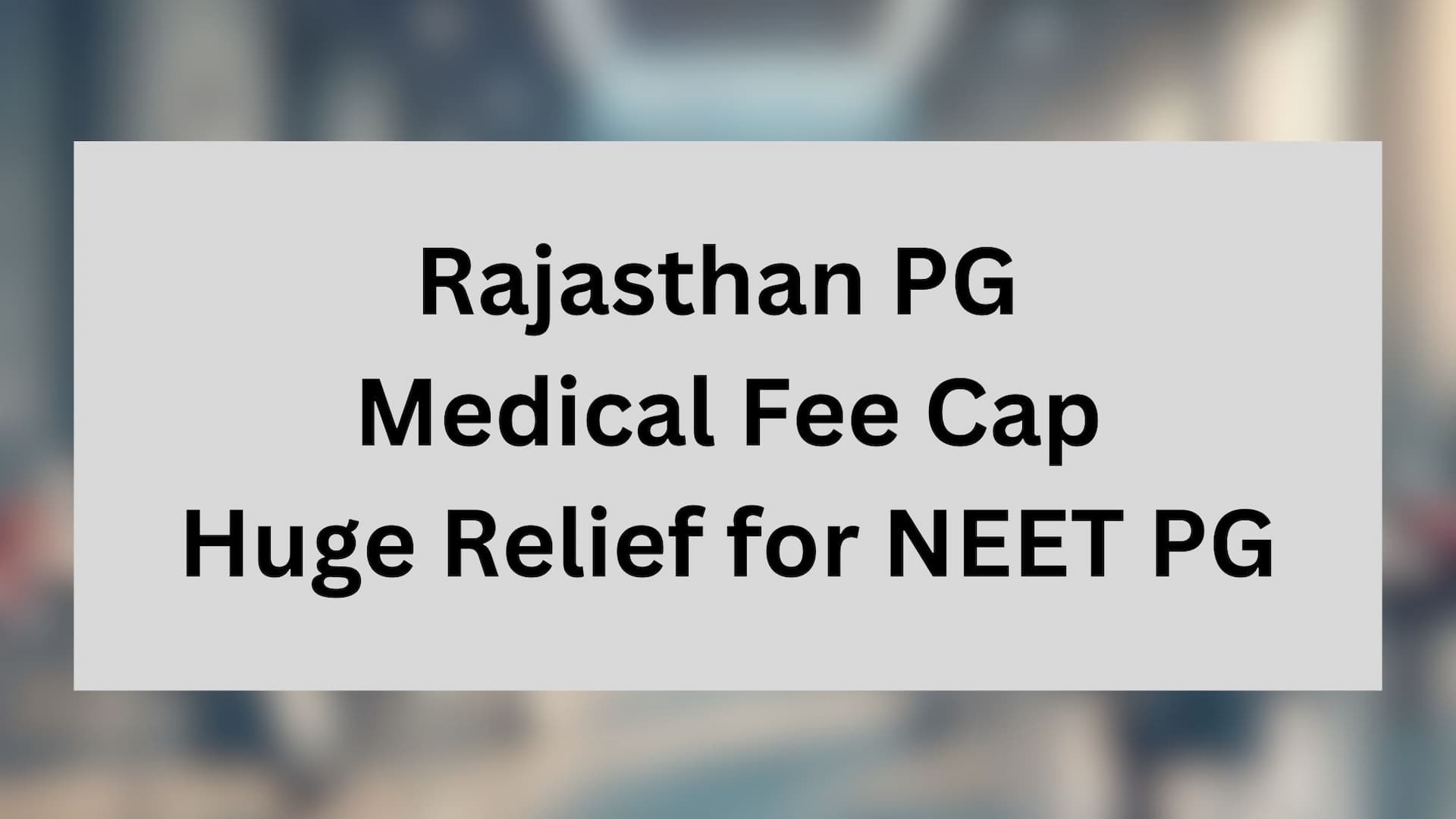Rajasthan government caps PG medical fees at ₹32.5 lakh for clinical courses
Rajasthan's government has announced a landmark decision to cap the Post Graduate (PG) medical course fees in private colleges, effective from the 2025 academic session. This move standardises tuition fees for MD/MS courses, significantly reducing the financial burden for NEET PG aspirants across all seat categories (Government and Management Quota). Clinical courses are now capped at ₹32.5 lakh, pre-clinical at ₹2 lakh, and para-clinical at ₹6 lakh per year. The decision aims to bring transparency, curb fee inflation, and promote merit-based medical education. This article explores the revised fee structure, its profound implications for students, and the government's strict enforcement measures.

The pursuit of a postgraduate medical degree, particularly in high-demand clinical specialities, has long been a financially demanding aspiration in India. In a landmark decision addressing concerns of fee exploitation, the Rajasthan government has announced a strict and standardised fee structure for MD/MS courses across all private medical colleges in the state, effective from the current 2025-26 academic session. This move is poised to reshape the landscape of medical education, offering substantial financial relief to thousands of NEET PG aspirants and promoting a more merit-driven system.
Previously, fees for clinical PG courses in many private institutions in Rajasthan could range wildly, often soaring to ₹45 lakh to over ₹1 crore per annum, depending on the course and the type of seat (Management or NRI quota). The new mandate, fixed by the state’s Fee Regulatory Committee (FRC), standardises the annual tuition fee, irrespective of the seat category, for both government quota and management quota seats.
Landmark Fee Structure: A Breakdown of New PG Limits
The new policy establishes a clear, unified fee ceiling, a stark contrast to the previously opaque and often exorbitant fee structures. This transparency is a major win for students and their families who can now plan their education budget with certainty.
- Clinical Courses (High-Demand Specialities):
- Annual Fee Capped at ₹32.5 Lakh. This applies to sought-after specialities like General Medicine, General Surgery, Radiodiagnosis, Paediatrics, and Orthopaedics.
- This is a massive reduction from previous figures, where annual fees could be significantly higher, making many aspirational courses practically unaffordable for the middle class.
- Para-Clinical Courses:
- Annual Fee Capped at ₹6 Lakh. Courses such as Pathology, Microbiology, and Pharmacology now fall under this significantly lower bracket.
- Pre-Clinical Courses (Non-Clinical):
- Annual Fee Capped at ₹2 Lakh. Subjects like Anatomy, Physiology, and Biochemistry are covered by this lowest fee ceiling, making foundational research and teaching careers more accessible.
Note: Initial reports indicate that the total amount payable at the time of admission may include other mandatory, smaller charges such as registration and security deposits, bringing the initial amount slightly higher than the tuition fee cap.
Curbing Commercialisation: Government's Stance and Enforcement
The primary objective of this intervention is to stop the commercialisation of higher medical education and ensure that financial background does not become a barrier to merit. The government has put in place stringent rules to ensure private colleges strictly adhere to the new fee structure.
- Mandatory Uniformity: The standardised fee applies universally to all private medical colleges in Rajasthan for both State Quota and Management Quota seats, eliminating the practice of differential pricing based on seat type.
- Zero Tolerance for Violations: Colleges found charging fees above the stipulated cap face serious consequences. The directive mandates a compulsory refund of the excess amount collected.
- Penalty Clause: In a clear warning to non-compliant institutions, the refund of the excess fee must include a hefty 12% annual interest on the overcharged amount.
- Affiliation and Legal Action: Repeated or severe violations could lead to more stringent actions, including the potential withdrawal of college affiliation or the transfer of students to compliant institutions, demonstrating the state's resolve for strict enforcement.
Impact on NEET PG Aspirants and Counselling Strategy
For thousands of NEET PG 2025 candidates, this announcement fundamentally alters their counselling strategy and overall financial planning. The assurance of a fixed, comparatively lower fee opens up more seats in private colleges for students who might have otherwise restricted their choices solely to government colleges due to budgetary constraints.
- Increased Accessibility to Clinical Seats: The dramatic reduction in fees for clinical courses means that merit-holding students from economically weaker backgrounds now have a more realistic shot at pursuing their dream specialities without accumulating crippling debt.
- Shift in Preference Dynamics: With the fee variable largely standardised across private colleges, other factors are likely to gain importance during the counselling process. Aspirants will place greater emphasis on:
- Hospital patient load and clinical exposure.
- Faculty quality and research opportunities.
- College and hospital infrastructure.
- Location and associated living costs (like hostel charges, which have also been standardised in some cases).
- Planning for Associated Costs: While tuition fees are capped, aspirants must still budget for other necessary expenses. For example, standardised hostel charges have been reported to be around ₹3.5 lakh for single-sharing and ₹2 lakh for double-sharing accommodations per course. Candidates must check the official counselling information for the exact breakdown of the total amount payable at admission.
Conclusion
The Rajasthan government’s decision to cap PG medical fees is a progressive and significant step towards democratising medical education. By bringing transparency and uniformity to the fee structure, the state has not only provided immense financial relief to the current batch of NEET PG 2025 aspirants but has also paved the way for a more merit-focused system. As the NEET PG counselling rounds for 2025 progress, this move will undoubtedly influence candidate preferences and ensure that a larger pool of deserving students can contribute to the nation's healthcare sector without the crushing burden of excessive educational debt.
